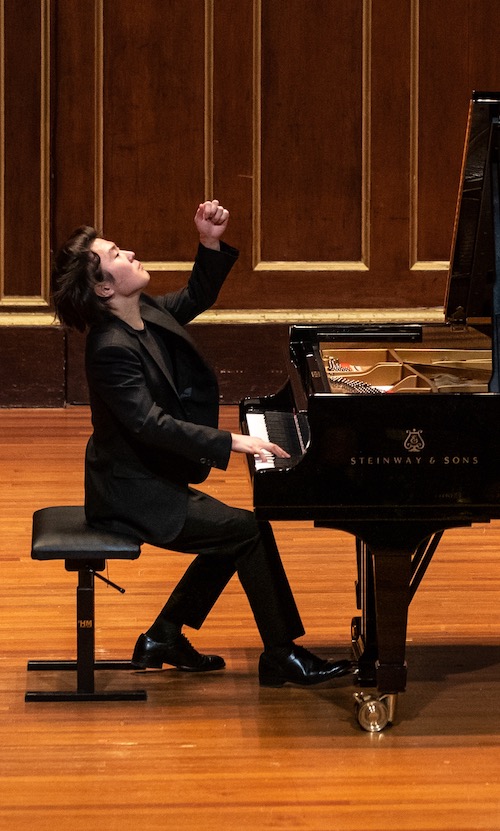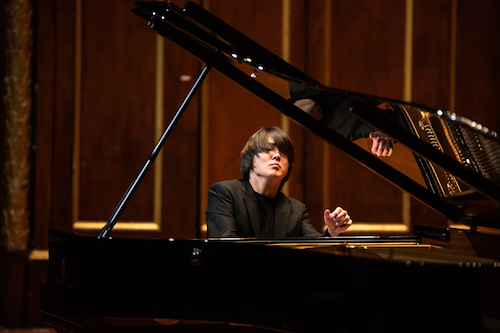Cho bridges musical epochs in thoughtful, invigorating Celebrity Series program

Seong-Jin Cho performed a recital for the Celebrity Series Sunday at Jordan Hall. Photo: Robert Torres.
For intellectually minded music lovers, pianist Seong-Jin Cho’s recital program on Sunday afternoon at Jordan Hall fit like a glove. A pair of suites by George Frideric Handel paired nicely with Johannes Brahms’ Variations and Fugue on a Theme by Handel. Brahms’s mentor Robert Schumann’s knuckle-busting Symphonic Etudes tied the younger composer into a broader musical tradition.
But musical performance isn’t just a theoretical exercise and, in the event, Cho, who won the 2015 Chopin Competition and was making his Celebrity Series debut, went thoughtfully beyond what the printed word suggested. One caught the connections between the listed composers and pieces, yes, but also veiled references to a panoply of 19th-century musicians who influenced Brahms and Schumann. It was a fascinating and often invigorating approach to this fare, though it did make for a slightly overwhelming afternoon of Romantic pianism.
Regardless, things began simply enough with Cho’s limber performances of Handel’s keyboard Suites Nos. 2 and 8. On Sunday, neither reading lost sight of the dancing impetus behind the notes.
In the F-major (No. 2), the pianist spun out the music’s blend of dreamy songfulness and playful counterpoint with improvisational ease. Meanwhile, the sterner F-minor (No. 8) unfolded with bold attacks (especially in the Fugue) and episodes of gripping storminess, notably in the tempestuous Courant and whorling Gigue.
Brahms’s Variations and Fugue proceeded in a similarly directed manner, though here painted on a much larger canvas. To be sure, this 1861 score is an epic par excellence. As if its twenty-five variations on a sixteen-bar melody from Handel’s Suite in B-flat aren’t comprehensive enough, the closing fugue is a tour-de-force of contrapuntal invention.
Yesterday afternoon, Cho delivered it all with flexibility, color, and attention to balances. Tempos generally flowed and, while there was an occasionally breathless quality to some of the later fast sections, his overall feeling for the music’s pacing was right.
The Korean pianist also exhibited a firm sense of spirit in each of the variations. The first tripped jauntily. Number 3 was sweet and playful, while the Risoluto fourth, its slashing accents mightily articulated, thundered.
Indeed, in this reading the dark variations emerged potently: the Largamente’s soberly treading bass line seemed to evoke Chopin’s famous “Funeral March” while the slithering Legato (No. 20) was, despite inhabiting a major tonality, roundly ominous. Crowning the whole was a dynamic account of the Fugue in which Cho’s ear for voicings and grasp of the movement’s structure fused into a searing peroration.
After the Variations came four selections from Brahms’s Op. 76 Klavierstücke. In three Capriccios plus the Intermezzo in B-flat major, the pianist ably drew out the music’s play of character and color, especially the B-minor Capriccio’s impish brio.
Schumann’s Etudes were distinguished by Cho’s immense tonal palette and huge dynamic range. To be sure, this expansive piece, which appeared in various editions during and after Schumann’s life, has a convoluted performing history. Yet the edition presented on Sunday (twelve etudes with a theme and two “posthumous variations” woven among them) makes convincing musical sense on its own.
Cho’s commanding account of the music’s big moments certainly argued for themselves. The opening etude snapped boldly. The rumbling seventh drove headlong, while the eighth breathed intensity and the concluding Allegro brillante built to a magnificent, quasi-orchestral zenith.
Yet his performance wasn’t just about brawn. The Etudes’ reflective moments, for instance, were noble and inward. Meanwhile its playful ones, like the Paganini-esque arpeggios in the Vivace, sparkled. Taken together, this was a reading of strong musical convictions and bold contrasts—not unlike what we know of Schumann himself.
Afterwards, Cho rewarded a lusty ovation with a pair of encores: first, Wilhelm Kempff’s arrangement of Handel’s Minuet in G minor and then, improbably, a swaggering performance of Chopin’s Heroic Polonaise. After all he’d just accomplished, the latter seemed like it might be a bridge too far—until, a couple of measures in, it was abundantly clear that it wasn’t.
The Celebrity Series presents the Emerson String Quartet playing music by Bartók, George Walker, Shostakovich, and Beethoven at 3 p.m. January 22, 2023 at Jordan Hall. celebrityseries.org
Posted in Performances
